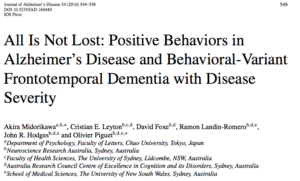オーストラリア・シドニーにあるNeuroscience Research Australia (NeuRA)との共同研究の成果(All Is Not Lost: Positive Behaviors in Alzheimer’s Disease and Behavioral-Variant Frontotemporal Dementia with Disease Severity )が、アルツハイマー病の専門誌( Journal of Alzheimer’s Disease)に掲載されました。
論文は以下からダウンロードできます。
http://content.iospress.com/articles/journal-of-alzheimers-disease/jad160440
論文タイトル:
All Is Not Lost: Positive Behaviors in Alzheimer’s Disease and Behavioral-Variant Frontotemporal Dementia with Disease Severity
著者:
Midorikawa, Akira | Leyton, Cristian E. | Foxe, David | Landin-Romero, Ramon | Hodges, John R. | Piguet, Olivier
抄録:
Background: Anecdotal evidence indicates that some patients with dementia exhibit novel or increased positive behaviors, such as painting or singing, after the disease onset. Due to the lack of objective measures, however, the frequency and nature of these changes has not been formally investigated. Objective: This study aimed to systematically identify changes in these behaviors in the two most common younger-onset dementia syndromes: Alzheimer’s disease (AD) and behavioral-variant frontotemporal dementia (bvFTD). Methods: Sixty-three caregivers of patients with dementia (32 caregivers of AD patients and 31 caregivers of bvFTD patients) participated in the study. Caregivers rated the presence and frequency of positive and negative behavior changes after the onset of dementia using the Hypersensory and Social/Emotional Scale (HSS) questionnaire, focusing on three domains: sensory processing, cognitive skills, and social/emotional processing. Six composites scores were obtained reflecting these three domains (two composite scores for each domain). Differences across scores and ratios of increased and decreased behaviors were analyzed between AD and bvFTD, at different disease severity levels. Results: After disease onset, significant changes in the sensory processing domain were observed across disease severity levels, particularly in AD. Composite scores of the other domains did not change significantly. Importantly, however, some novel or increased positive behaviors were present in between 10% (Music activities) and 70% (Hypersensitivity) of AD and bvFTD patients, regardless of disease severity. Conclusions: We provide the first systematic investigation of positive behaviors in AD and bvFTD. The newly developed HSS questionnaire is a valid measure to characterize changes and progression of positive behaviors in patients with dementia.
DOI: 10.3233/JAD-160440
Citation: Journal of Alzheimer’s Disease, vol. 54, no. 2, pp. 549-558, 2016

